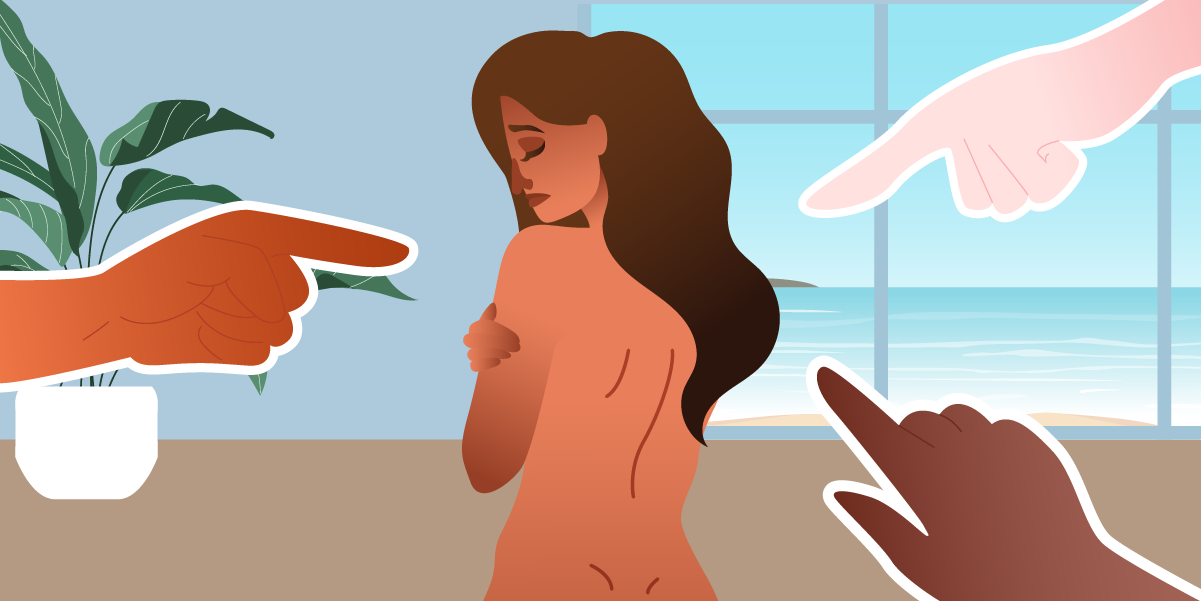
The idea of sex is often either glamorized or demonized. On one side, you see attractive actors making out in movies and TV shows, bathed in romantic lighting. On the other, you hear statements like:
“Women get loose down there every time they have sex.”
“Masturbation is a sin!”
“Sex is meant for procreation…”
Not only that, but in most conservative countries, parents avoid talking to their kids about sex, while schools stick to the biological aspects of sex. Topics like bodily changes, hormones, sexual consent, and pleasure are often skipped, as educators assigned aren’t comfortable with talking about it themselves as they’re not guided or given enough resources for such discussions.
Fortunately, the sex-positive movement continues to grow, especially online. Sexual educators now have multiple platforms to openly discuss sex, guiding people through deeper aspects of pleasure and intimacy.
But despite these resources, many still struggle with sexual shame due to the environments they grew up in. If you’re one of them, that’s okay. It’s completely normal to feel this way when the only messages you’ve received about sex have been negative.
We know that opening up about sexual shame can be difficult, so for now, just take your time and read. This could be the first step in your journey toward unlearning and healing.
What is Sexual Shame?

Sexual shame refers to the negative and shameful feelings surrounding sex and pleasure. Those who experience it may struggle with the following:
- Discomfort in discussing sex-related topics, even with medical professionals.
- Being uneasy with nudity.
- Difficulty in staying present during sex.
- Difficulty in expressing their desires in sex.
- Negative feelings after having sex or masturbating.
As mentioned earlier, the environment we grew up in—along with messages from family, media, and religion—shapes our perception of sex and can contribute to sexual shame. In some cases, past sexual trauma can also play a significant role in developing these feelings.
Ways to Unlearn Sexual Shame
When sexual shame goes unaddressed, it can lead to dissatisfaction in the bedroom, relationship struggles, and never-ending stress surrounding sex. Unresolved shame can also make it difficult to provide healthy guidance to your children, potentially passing down the same harmful messages you received growing up.
It’s completely normal to have desires, and there’s nothing wrong with wanting or engaging in consensual sex. That’s why it’s important to work through these negative feelings and free yourself from shame. Here’s how you can start:
1Reflect.

The first step is to reflect. Keeping a digital journal (preferably locked and not synced online) or a physical notebook can help with this process. Write down the sexual experiences that made you feel extremely uneasy, as well as the moments when you felt the most free and liberated. Take your time with this; revisiting certain memories may be triggering, so don’t force yourself to go through them in a single session.
It’s also helpful to note the beliefs about sex that you grew up with. Did they come from a family, like a parent or guardian? Were they taught by an authority figure, such as a teacher? What misconceptions did you hear from friends or the media? Write them all down.
This journaling exercise will help you see the bigger picture and why you might feel negative about sex or struggle to talk about it. Once you identify the possible causes, you can work on reframing your thoughts. Try countering negative beliefs with positive affirmations, incorporating sex-positive messages into your daily mindset, or even sending over the highlights of your journal to your therapist so they can come up with a doable plan to help you reframe your sexual shame.
2Research.

What were the questionable beliefs about sex that you grew up with? Take a moment to reflect on them. The good news is that we now have easy access to research papers, books, and other credible resources at our fingertips. That said, educate yourself on these misconceptions, challenge the anxieties they’ve created, and replace them with informed perspectives.
3Reach out.

Another important step in reclaiming your sexuality and overcoming shame is reaching out—to your partner, friends, a supportive community, or a therapist. Share only what you’re comfortable with, and take it at your own pace.
If you’re struggling to find a supportive community in your area, consider looking into organizations and online spaces.
In the Philippines, Lunas Collective offers a volunteer-powered online chat helpline and care space for women. You can also explore Unprude, a sex therapy app led by Dr. Rica Cruz, one of the country’s top experts in sexual wellness and education. Forums like Reddit and educational webinars can also help you connect with like-minded individuals and gain insights from others on the same journey.
4Rediscover.

After reflecting on your past, debunking myths, and reaching out to a supportive community, it’s time to rediscover pleasure in ways that feel right for you.
This could mean attending sexual wellness events, joining sex-positive organizations, reading sex-positive literature, watching erotic films, exploring self-pleasure with masturbation or sex toys, or engaging in intimacy with your partner. Use the tools you’ve learned to deal with the negative thoughts and fully immerse yourself in the experience.
Takeaway
Unlearning sexual shame and reclaiming a part of yourself that you’ve suppressed for years may not be easy, but it’s absolutely possible. It takes time, patience, and consistent effort. Educate yourself with reputable sources, surround yourself with supportive, sex-positive people, and gradually open yourself to new sexual experiences at your own pace.
Consulting a sex therapist is also a great step; they can provide a fresh perspective on your journey and guide you in understanding what steps to take next.


